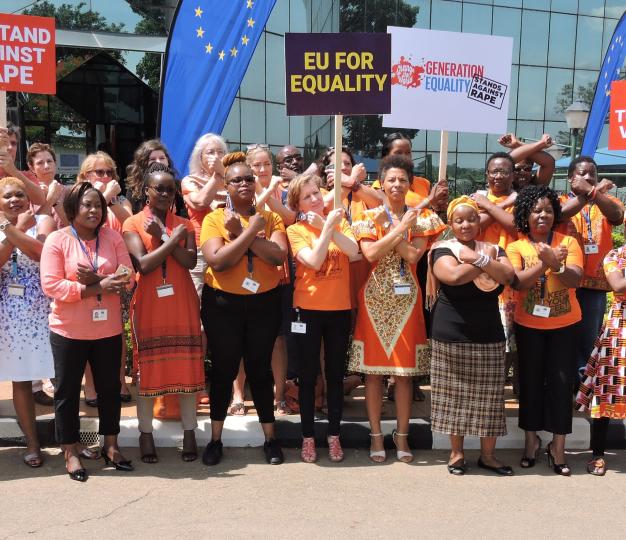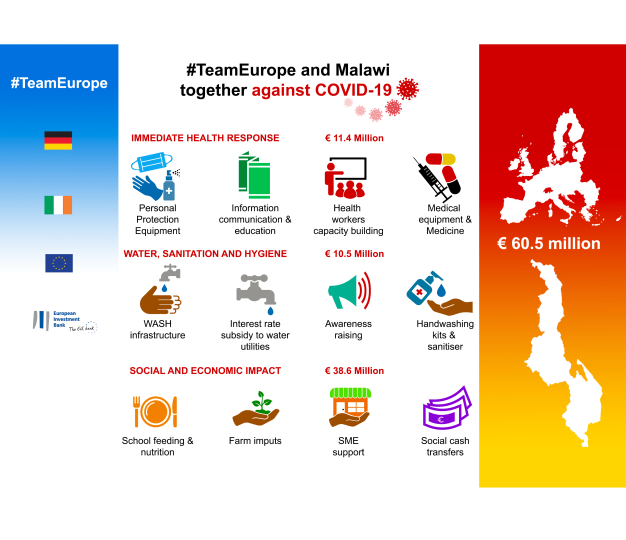Who we are
Present in the country since 1976, the EU has a longstanding and cordial relationship with Malawi, focusing mainly on development cooperation. The EU's engagement with Malawi is part of the wider engagement the EU enjoys with all African, Caribbean and Pacific countries through the ACP-EU Partnership Agreement, signed in Cotonou on 23 June 2000, and which will be replaced by a new, ambitious partnership agreement from 2022.
European Union Delegation to Malawi
|
The Delegation of the European Union (EU) to Malawi has a number of functions:
The EU's engagement with Malawi is part of the wider engagement the EU enjoys with all African, Caribbean and Pacific countries through the ACP-EU Partnership Agreement, signed in Cotonou on 23 June 2000, which has been extended to June 2023. A new treaty has been negotiated to replace the current agreement and should enter into force by mid-2023 It will bring the relationship between the EU and its ACP partners into a new era, building on the principle of a partnership of equals, around shared principles and interests. The EU's engagement with Malawi is also part of the wider partnership between the African Union and the European Union, which revolves around the shared priorities of:
In 2021 the European Union has launched the Global Gateway, a new European Strategy for the period 2021-2027 to boost smart, clean and secure links in digital, energy and transport sectors and to strengthen health, education and research systems across the world. In Africa the Investment Package linked to the Global Gateway will be delivered through Team Europe initiatives: the EU, its Member States and European financial institutions will work together to support concrete and transformational projects jointly identified in priority areas. The Multi-Annual Indicative Programme (MIP) for the period 2021-2027 translates these wider commitments in a solid partnership with the Government of Malawi; it sets out the joint priority areas for cooperation, based on the national development plan Malawi 2063. The MIP has been developed in close consultation with Malawi Government, Civil Society Organisations, including women and youth organisations, local authorities, representatives from the private sector, the United Nations and other partners, and of course EU Member States. In line with Malawi 2063, the MIP has the broad purpose of supporting the development of an inclusive, wealthy and self-reliant nation, capable of progressing beyond its need for assistance, and thereby improving the lives of all Malawians, consistent with the EU’s strategic interests and values. The MIP is based on a clear understanding of the EU and Malawi’s mutual interests and responsibilities, reflecting the comprehensiveness and maturity of the relationship. Future interventions funded by the European Union will fall under the following interlinked priority areas and sectors: Priority area 1: Green and resilient economic transformation
Priority area 2: Democratic and economic governance
Priority area 3: Human development and social inclusion
In addition, the following are crosscutting priorities of crucial importance for the realisation of the objectives of this MIP:
The total allocation for the Multiannual Indicative Programme for Malawi covering the period 2021-2027 amounts to EUR 352 million. The financial allocation for 2025-2027 will be determined following a review in 2024. |
Our Office
The Delegation of the European Union (EU) to Malawi has a number of functions:
- Representing the EU in all its affairs; an Ambassador represents the EU in Malawi and holds the local EU Presidency in Malawi (unless the Presidency country is represented).
- The Delegation has a Political, Press and Information section which is responsible for the political partnership with Malawi. It ensures follow-up of bilateral relations in the areas of politics, promotes the values of the EU and helps to increase visibility, awareness and understanding of the Union in the host country.
- The EU Delegation to Malawi also has a Cooperation section, which is composed of three sub-sections: Social Sector and Infrastructure; Sustainable Agriculture; and Economics and Private Sector. This section ensures the long-term programming and management of aid in cooperation with the Malawi Government.
- Finally, the Delegation has a Finance and Contracts section, and an Administration section, ensuring smooth daily operations.
COVID Support and Actions
At the onset of the COVID pandemic in Malawi, the German and Irish embassies and the EIB devised together with the EU delegation, under a Team Europe approach, a comprehensive support package to Malawi’s COVID response amounting to just over EUR 60 million.
This joint initiative of Team Europe supports three broad objectives. Almost two thirds of the funds is allocated to programmes mitigating the social and economic impact. This entails supporting the government’s programme on social cash transfers, temporarily targeting also marginalised households in urban areas, the government’s programme on school feeding, allowing in particular to continue this through take-home rations while schools are closed or under restrictive measures, and, to a lesser extent, recovery support to SMEs and smallholder farmers.
A second broad objective concerns the support to water, sanitation and hygiene (WASH), which involves a broad set of interventions ranging from setting up WASH infrastructure and providing WASH supplies to an interest rate subsidy for water facilities and awareness raising on preventive measures. The third and final objective specifically aims to provide immediate health response, whether it is in the form of PPEs, medical equipment or training of health workers and information to the public.



